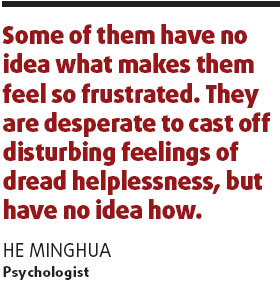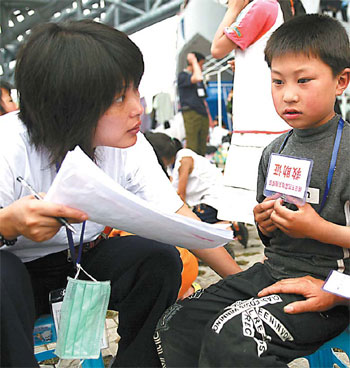Shaken to the core
A man picks up the phone and dials a number. When his call is answered, he immediately breaks down. "They are so poor, and desperate. I see them on the TV and in the newspaper. They have lost everything, house and family. I sense so much of their pain I can barely eat or sleep these days. Please help me," he begs, brokenly.
A gentle voice calms and comforts him. "It's okay. I understand how you feel. Tell me what has happened, and take your time."
This is one of the dozen such calls for help that the Beijing Maple Women's Psychological Counseling Center has received since May 27, when it opened a post-traumatic psychological support hotline.
The predecessor to the Counseling Center was the Women's Research Institute, founded in 1988. The center set up China's first women's hotline focusing on women's psychological health in 1992.
|
Both quake victims and people outside the devastated areas in Sichuan need psychological support. Huo Yan |
Its new post-disaster hotline provides emotional support for people affected by the quake - not just earthquake victims and volunteers involved in rescue and relief work, but those outside the quake zone who also display symptoms of post-traumatic stress disorder (PTSD) after this deadly disaster in Sichuan.
As experts point out, the latter sufferers have been exposed to floods of information about the earthquake and its tragic consequences in graphic detail. Although less traumatized than those at the epicenter, their psychological needs nonetheless warrant attention.
Many callers are not Sichuan natives and neither do they have friends or relatives in the quake zone, according to the center. But having followed the extensive media coverage of the earthquake, their anguish is none the less real.
"Some say they cry throughout the TV reports. They have sleepless nights and live in fear of another earthquake, even though they may have never actually experienced one," says the center's psychologist Su Guosu. She adds that young and elderly people alike display these symptoms.
Lian Ying is in her 20s and works in advertising in Beijing. She says that she felt particularly depressed during the three days of national mourning that was declared for the quake victims.
"When I saw the national flag flying at half-mast and, together with colleagues observed silent commemoration, I actually found it difficult to breathe. People around wore dark or gray clothes. The disaster seemed to have destroyed all color in our lives," she recalls.
Lian tries to uplift her spirits by pouring out her sadness to her parents, and distracting herself by dining out and shopping with friends. She has started feeling better now since more positive news about quake relief work is appearing in the media.
"It occurs to me that we who are alive should actively treasure what we have, and be happy with life. This is our sole consolation in the face of so many deaths," she says.
People like Lian find ways of dismissing negative emotions that affect their mental well-being. But others lack this capacity for self-healing.
There have been reports of people whose mental distress at the earthquake has had physical repercussions, such as high blood pressure, palpitations and insomnia. They need both medical aid and professional psychological guidance.
He Minghua, a psychologist with the 12355 Beijing Teenagers Hotline and the Children's Service Network, suggests the down-to-earth remedy of spending less time watching TV and more on uplifting social activities, such as taking exercise and watching live entertainment. If there is still no improvement, then talk to professionals, He concludes.

Having just come back from the quake zone, however, she is aware that many Chinese people dare not seek help from psychologists. Some of her friends who suffer from quake-generated stress hide their emotions, preferring to let time heal their invisible wounds.
"Some of them have no idea what makes them feel so frustrated. They are desperate to cast off disturbing feelings of dread helplessness, but have no idea how.
"Morbid sentiments accumulate, and unless diffused through psychotherapy this may easily affect physical as well as mental well-being," she says.
She notes, however, that in the aftermath of the earthquake, many people have become cognizant of the importance of psychological crisis intervention. It therefore offers the opportunity to promote the importance of psychological knowledge among the general public, and encourage people to pay more attention to their psychological health.
"People should know that they need psychological support at times other than grave disasters like the earthquake. They must be as brave when dealing with their mental ills as when they treat colds and fevers," she says.
(China Daily 06/04/2008 page19)















